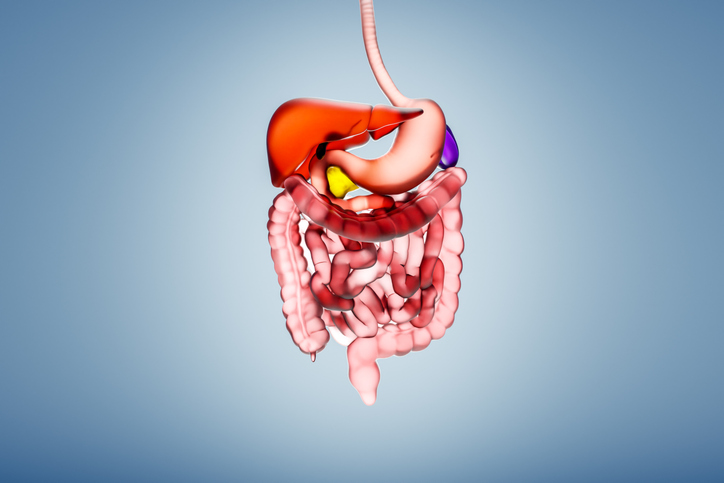
Syntis Bio, a startup aiming to bring patients a key benefit of gastric bypass surgery but in the form of a pill, has raised $33 million as its lead program continues early clinical development as a potential new treatment for obesity.
The Series A financing announced Tuesday was led by Cerberus Ventures.
Syntis’s approach to obesity involves redirecting nutrient uptake. This duodenal nutrient exclusion happens in gastric bypass surgery, with nutrients that would normally be absorbed in the upper part of the small intestine redirected to the distal part of the organ. That’s important because this region of the small intestine stimulates secretion of GLP-1 and other hormones that promote feelings of satiety.
Unlike the permanent nature of gastric bypass surgery, Syntis’s nutrient redirection is temporary. The startup’s technology, called SYNT (short for SYNthetic Tissue-lining), uses a capsule to deliver compounds that form a temporary polymer coating to line the duodenum, the upper part of the small intestine. This lining lasts about 24 hours, after which it is naturally cleared from the body.
Syntis’s obesity program, SYNT-101, is being developed as a once-daily pill. In preclinical research in rodents presented in April during the European Congress on Obesity and Weight Management, results showed consistent 1% weekly weight loss over the six week study period. The experimental treatment also preserved muscle mass, which is important because muscle loss is a side effect of currently available obesity drugs. Syntis also presented data from a pilot study in humans. Results showed evidence of nutrient redirection and modulation of satiety hormones. SYNT-101 was safe and well tolerated; no adverse events were reported.
Beyond supporting SYNT-101 through Phase 1 testing, the new funding will also enable Syntis to begin a Phase 1 study for SYNT-202, an oral enzyme therapy in development for homocystinuria. This rare inherited disease leads to deficiency of the enzyme needed to break down homocysteine, an amino acid. Symptoms include developmental delays and vision problems. Current treatment options for homocystinuria includes vitamin supplements and dietary restrictions.
The SYNT platform technology comes from the research of Giovanni Traverso and Robert Langer, both professors of biomedical engineering at MIT. Beyond nutrient exclusion, this technology can be engineered to install and sustain gut-restricted enzymes in the small bowel. The company says its approach can also enhance the oral bioavailability of drugs and target new tissues throughout the body.
Syntis was co-founded by Traverso, Langer, and CEO Rahul Dhanda. The startup raised $15.5 million in seed financing in 2023 and launched last year. Two Small Business Innovation Research Awards in 2024 are supporting ongoing development of the SYNT platform. Syntis’s latest financing includes new investors Mansueto Investments, Woori Venture Partners and Apollo Labs. Founding investors BOLD Capital Partners, W. R. Berkley Corporation, Safar Partners, Portal Innovations, Colorcon Ventures and Cerity Partners Ventures also participated.
Protagonist Therapeutics Joins the Obesity Field With a Triple-Acting Drug
Protagonist Therapeutics had been telling investors it expected to nominate an oral drug candidate for obesity in the second quarter of this year. After the market close on the last day of the quarter, it finally unveiled the program.
Protagonist’s PN-4770 is a peptide engineered to bind to and activate three targets, the GLP-1, GIP, and glucagon receptors. In addition to the once-daily oral formulation, the company said it will also develop a once-weekly injectable version.
By going after GLP-1, GIP, and glucagon with a single drug, Protagonist joins a competitive mix of companies pursuing those targets. Eli Lilly’s broad cardiometabolic clinical development program for its drug candidate, retatrutide, includes an ongoing pivotal test in obesity. Positive Phase 2 results for once-weekly injectable retatrutide were announced in 2023. In March, Novo Nordisk agreed to pay $200 million up front for global rights (excluding greater China) to a once-weekly injectable United Biotechnology peptide drug that addresses GLP-1, GIP, and glucagon. The pipeline of startup Kailera Therapeutics, which launched last fall, includes an injectable drug that addresses the three targets. An oral small molecule option could come from Septerna, whose pipeline includes a discovery-stage program for the targets.
Protagonist said preclinical research is underway that could support the filing of an investigational new drug application for PN-4770. The company expects to begin human testing for this drug in the second quarter of 2026. As of the end of the first quarter of this year, Protagonist reported its cash position was $697.9 million, which it expected would support the company at least through the end of 2028.
Photo: OsakaWayne Studios, via Getty Images





